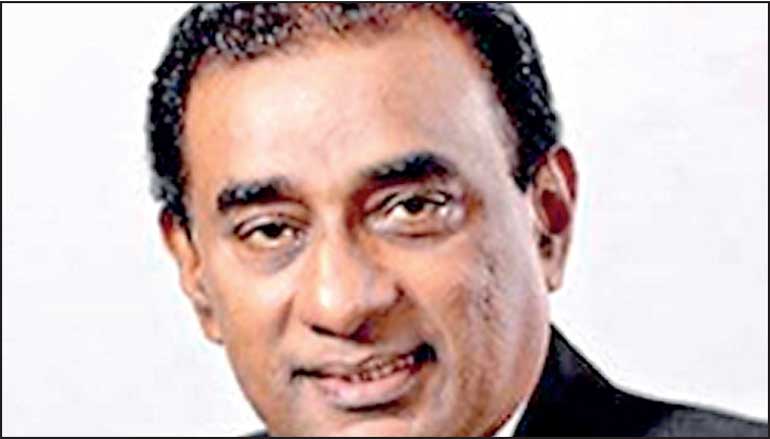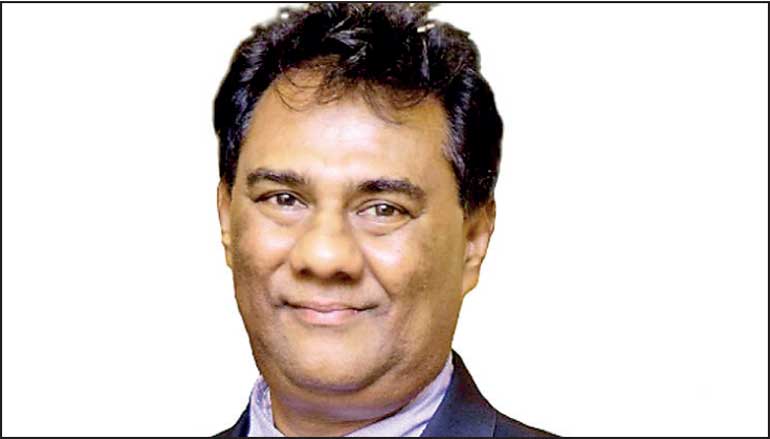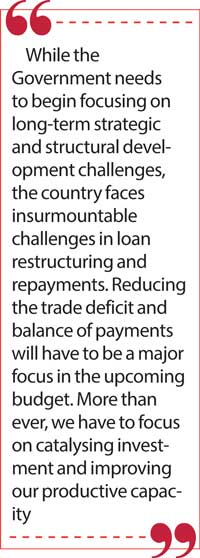 |
|
Ceylon Institute of Builders President Dr. Rohan Karunaratne
|
 |
|
Ceylon Institute of Builders Vice President Ruwan De Silva
|
The Budget 2024 is being presented at a critical time for our country. The country is still battling with the unprecedented economic crisis which had a profound negative impact on our economy. However, the situation has been slowly, but steadily improving as a result of the progressive and active role played by the current Government in winning support from the IMF to help us in tiding over the crisis and the progress made in negotiating with creditors to restructure the loans.
While this has eased the hardship to some extent, a lot remains to be done. While the country can see a light at the end of the tunnel, we are still not out of the woods. The Budget 2024 will need to consolidate on the painful gains made by the country in the last one year and pave the way for continuing the painful restructuring that we need to tread to overcome the crisis.
While the Government needs to begin focusing on long-term strategic and structural development challenges, the country faces insurmountable challenges in loan restructuring and repayments. Reducing the trade deficit and balance of payments will have to be a major focus in the upcoming budget. More than ever, we have to focus on catalysing investment and improving our productive capacity.
Sri Lanka’s foreign earnings come primarily from tourism, textiles, tea, rubber based and agriculture products, service sectors such as Information technology, financial services and transport have increased substantially. Similarly, a sector that has high foreign earning potential is the construction sector. But adequate attention has not been given to the construction sector by successive governments.
Ceylon Institute of Builders (CIOB), a premier institution for construction industry in Sri Lanka, has taken an initiative to present its budget proposals for reviving the construction industry to the Government for including in the Budget 2024.
CIOB President Dr. Rohan Karunaratne mentioned, “During the last five years, the construction industry has been undergoing severe financial difficulties and cash flow problems due to a multitude of reasons. As is known, the Easter day bombings and the resultant fallouts; emergence of the COVID pandemic and the subsequent lockdowns, disrupted supply chain, etc.; and finally, the worst economic crisis that the country had been facing during the last one year have had a devastating effect on our economy and a negative impact on all the industries including the construction industry.
“Contractors and industry stakeholders have and continue to encounter issues such as payment delays, cost overruns, and contractual disputes. They restrict the cash flow, damage financial stability, and significantly weaken contractors’ ability to fulfil their financial responsibilities. Contractors often face the difficult situation of resorting to high-interest loans to cover the financial shortfall. This not only increased their debt burdens but also exposed them to potential insolvency. Worker wage delays lead to tense labour relations in the industry and demoralise the workforce.”
 The proposals submitted to the Government by CIOB seek to address the above problems affecting the industry and introduce measures to develop our construction industry on par with the international standards and become a major export earner for our country.
The proposals submitted to the Government by CIOB seek to address the above problems affecting the industry and introduce measures to develop our construction industry on par with the international standards and become a major export earner for our country.
The salient proposals put forward by the CIOB are:
- Restarting of halted projects – CIOB proposes that the budget allocation should consider the completion of partially completed projects that are of national importance and those that foster Sri Lanka’s economic growth and may otherwise pose a security/health risk for occupants/general public as a result of the dangerous nature of half-done structures. Speaking on this subject, Dr. Karunaratne mentioned: “There has been a substantial increase in the cost of building materials and labour during the last four years. The cost required to complete a project now is significantly higher than the cost estimated at pre-COVID period. The contractors who undertook such projects are finding it difficult to complete the projects without incurring massive losses. Almost all the construction contracts did not have clauses that adequately address unforeseen events like a pandemic or economic crisis. To address these concerns, we requested the Government to take action to assess and revise the estimated cost of the ongoing construction projects that were awarded before COVID. We requested the Government to allocate the amounts equal to the difference between the current cost of the projects and the original estimated cost at the time of awarding those projects. This would enable the contractors of the relevant projects to receive payment for the cost overruns and complete the projects without incurring losses and complete the outstanding projects.”
- Government to negotiate and encourage the restarting of donor funded projects and support construction training.
- Attracting FDIs and local developments – a key reason for the reluctance of FDIs from investing in Sri Lanka was due to abnormally high construction cost in the years 2020-22. Local developers and house builders also followed this path and stopped projects due to high cost. CIOB who undertook this responsibility and negotiated with related parties were successful in bringing down construction cost benchmarked at (USD per m2):
- hotels & resorts - $ 940
- warehouses - $ 520
- 2 storied housing - $ 700
- Medium rise office buildings - $ 675
- medium rise apartments - $ 725
- As a result, we believe as we are now in par with our neighbouring countries, we are able to restart construction at a better rate than we previously thought.
- The resolution of this cost issue also means that, in order to keep cost low and become a self-sustaining industry we request government support for the local manufacturing of construction materials. We currently import about 70% of our materials. We hope to bring this figure down to 30% with help from the government who can provide necessary concessions to support local manufacturers to reduce imports which has a substantial impact on Sri Lankan economy and financial independence.
- Initiating a joint Public Private Sector effort to enhance investment and FDI inflow into the Country’s construction industry with the goal of increasing the foreign direct investment flowing into our country to reach at least 1% of the country’s GDP by 2025. This effort should have the guarantee of consistent policy to continue with the effort and a commitment to persist with its operations, irrespective of changes in Governmental leadership. Proposed scope of the committee will include identifying the target sectors which has potential for attracting FDI; identifying industry and enlisting organisations and subject specialists in the target sectors; identifying SOE lands that can be used to develop investment promotion zones with private sector participation; promoting investment into the identified areas through international chambers of commerce, chambers of commerce in other countries, Industry trade associations and SL diplomatic missions abroad; organising specific seminars targeting high net-worth investors, investment banks and other investment bodies; and developing a central database with statistical information and feasibility on available investment opportunities and projects that need investment, organised sector wise to facilitate easy search by potential investors.
- Fast-tracking and online application system for projects/buildings is necessary for this. As well as providing a platform for investors to evaluate opportunities based on compatibility and restrictions.
- Relief to fallen contractors – The reality is, due to the aforementioned events such as the economic crises, the amount of contractors in Sri Lanka has reduced by roughly 80%. Today only 20-30% of construction companies are left in Sri Lanka. To make matters worse, those contractors who have lost the long battle to survive in business have not only lost their companies but have become bankrupt, debt-ridden, insolvent or worse. We therefore plead form the Government to use this opportunity to, not regain the businesses, but simply resolve these former contractors’ legal/banking issues, compensate for losses, support dispute resolution, etc. This is a responsibility of a country’s government.
- Construction sector development bank/fund – An Infrastructure development bank/fund could absorb low-cost funding i.e. Asian Infrastructure Investment Bank (AIIB), European funds, etc. relieving weight on Government. Simultaneously it aids contractors by replacing strict financial regulation (for instance, currently extant 100% security for loans) for contractors, with a soft-system and supporting (in pecuniary terms) infrastructure development projects, working capital for contactors, operational funding requirements, etc. Such a fund could be funded by private/public entities.
- in addition the overdependence for physical infrastructure projects from countries such as China makes the country’s infrastructure development process an unhealthy one.
- In order to ease the financing burden on the Government for the next raft of infrastructure projects the agenda is the private participation in such projects. The opportunities are vast. Mobilising private capital for public projects is not an easy task. Recent experience in India amply demonstrates this. Despite a large infrastructure financing need private capital in the form of private Public Partnerships or infrastructure bonds have been slow to come in as investors are very of tenuous processes and doing business with the state amidst concerns over corruption. This holds important lessons for Sri Lanka as well. While the policy of welcoming private investment into infrastructure has been clear and consistent by the government of Sri Lanka complicated procedures and implementation problems have tended to detain many private investors from participation in public infrastructure projects.
- This can also provide all necessary guarantees required for overseas projects, which would otherwise have to be provided by CBSL.
- Ministry – Construction industry is a vast industry involving over 2m people with the ability to generate copious possibility for self-employment. It has the capacity to generate about 8-9% and therefore we request a separate ministry for the construction industry to be established.
- Establishment of a high-powered committee with legal backing to address issues in the Sri Lankan construction industry with the objectives of developing mechanisms to ensure timely payments within the industry, facilitating efficient and cost effective dispute resolution mechanisms, identifying gaps in existing contracts and recommending improvements, encourage a culture of cooperation and collaboration among industry stakeholders, evaluating and compensating losses and cost overruns sustained by the contractors due to the impact of COVID and the current economic crisis, and evaluating and amending the current payment certification processes to address the specific problems faced by the industry.
- Taxes – The payment procedure in the construction industry is very different from other sectors. Contractors are subjected to VAT on payments before cash gains are received. We therefore request VAT to be charged on actual cash remuneration rather than documented payments and we also ask government to refrain from sudden, extreme tax changes which cannot be dealt with, due to the time-sensitive nature of our industry. Further the recently introduced 2.5% tax imposition should be deleted or applicable only for new projects.
- Supporting property developers – by providing exemptions on VAT, concessionary interest rates for housing loans with long-term payback periods, suitable income tax reductions with regard to housing loan interests and reasonably priced, flexible residential visa facilities for foreign property investors above $ 100,000.


 The proposals submitted to the Government by CIOB seek to address the above problems affecting the industry and introduce measures to develop our construction industry on par with the international standards and become a major export earner for our country.
The proposals submitted to the Government by CIOB seek to address the above problems affecting the industry and introduce measures to develop our construction industry on par with the international standards and become a major export earner for our country.